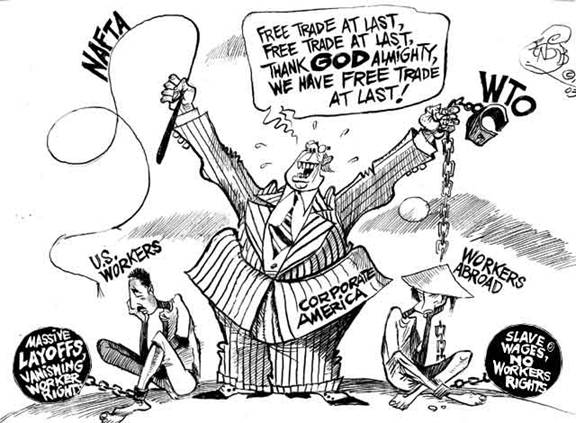Arguments for protectionism
 Governments use the following arguments to justify protectionism:
Governments use the following arguments to justify protectionism:
- To safeguard domestic employment - protectionist policies reduce the level of imports and increase aggregate demand [AD = C + I + G + (X-M)], resulting in a higher level of national output and employment.
- To correct balance of payments disequilibrium - as imports are discouraged, and exports encouraged, the balance of payments improves.
- To prevent labour exploitation in developing economies - preventing import of goods produced by exploiting cheap labour in developing countries will prevent this labour exploitation. However, it might also reduce export income and job opportunities for some of the poorest economies in the world.
- To prevent dumping - which is where economies sell goods in overseas markets at a price below the cost of production. Domestic consumers pay more than those buying overseas. Such low prices are part of a policy to destroy rivals in export markets.
- To safeguard infant industries - The new industries need some protection from the power of already established competitors to be able to grow and achieve economies of scale.
- To enable a developing country to diversify - Many developing countries are heavily dependent on exports of primary commodities. This can leave them very exposed to changes in international commodity prices. If they want to diversify and develop new export revenue streams, they may need to protect these new industries from full exposure to international competition for a while.
- Source of government revenue - where protectionism takes the form of a tariff, this will also raise revenue for the government, like any other tax.
- To protect strategic industries - a particular product or industry might be of strategic importance to a country, e.g. agriculture or coal, and protectionism may be justified on the grounds that it is keeping alive an industry which plays a vital part in the economy.


Question 1
Discuss the effects of free trade on:
- US corporations
- US workers
- workers abroad in developing countries.
Question 2
Suggest what the cartoonist believes about the role of NAFTA and WTO.

For this unit it is vital to be aware of up to date examples and issues. A useful way to find these is to search the Biz/ed In the News archive. You can do this in the window below, or right-click on the link and choose 'Open in a new window'.
Try searching on terms like:
- Protection
- Protectionism
- Trade
- Tariff
- Quota
